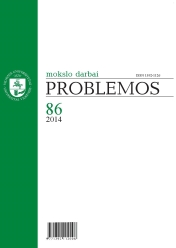KAS YRA BIOPOLITIKOS SUBJEKTAS? FILOSOFIJA, HUMANIZMAS IR GYVŪNIŠKUMAS
WHO IS THE SUBJECT OF BIOPOLITICS? PHILOSOPHY, HUMANISM, AND ANIMALITY
Author(s): Audronė ŽukauskaitėSubject(s): Philosophy
Published by: Vilniaus Universiteto Leidykla
Keywords: Arendt; Rancière; Agamben; Derrida; Esposito; human rights; life; animal.
Summary/Abstract: The essay analyses the paradox of human rights which is revealed in the works of Hannah Arendt, Jacques Rancière, and Giorgio Agamben. The notion of human rights is considered as a biopolitical apparatus, introducing a caesura between a living being and a political existence within the human itself. This division between animality and humanity in the human itself found in the concept of human rights resonates with the distinction between humanity and animality in philosophy. If classical thought – from Aristotle to Heidegger – postulates the distinction between man and animal, Agamben and Derrida insist that the animalization of man and the humanization of animal are the two sides of the same problem. After paraphrazing the problem in this way, the essay examines the philosophy of Roberto Esposito, who claims that all forms of life are equally important and immanent to themselves. By contrast to negative biopolitics, which is understood as the subjection of living beings to the power of norms and laws, Esposito seeks to create an affirmative biopolitics, where the norm is seen as the immanent rule that life follows to reach the maximum of its expression. Although such a notion of affirmative biopolitics may be considered as lacking political consequences, Esposito claims that by erasing the division between zoē and bios, or between naked life and political existence, we do not diminish our capacities to act in the political realm but, on the contrary, create the conditions for any being-in-common, which is the essence of the political.
Journal: Problemos
- Issue Year: 2014
- Issue No: 86
- Page Range: 7-22
- Page Count: 16
- Language: Lithuanian

